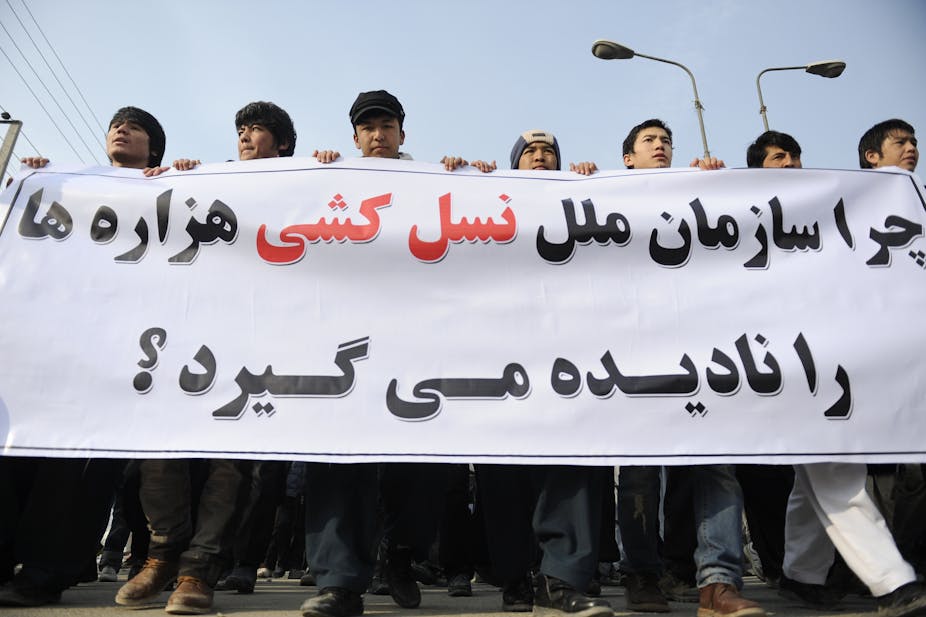Given that no census has been conducted in Afghanistan since 1979, it’s unclear whether the Hazara ethnic minority constitute 9% or near 20% of the country’s population. What is clear, however, is that they’re punching well above their political weight in the current presidential elections.
All three leading presidential hopefuls have Hazaras running on their three-person tickets. Abdullah Abdullah has allied with the high-profile MP Mohammad Mohaqeq; Ashraf Ghani runs with the former minister of justice, Sarwar Danish; and Karzai-backed Zalmai Rassoul has Habiba Sarobi, Afghanistan’s first female governor, as his running partner.
Considering that no one candidate yet holds a significant lead, winning the Hazara minority vote could swing the election in a candidate’s favour. But Hazaras haven’t always held such a prized position in Afghan politics.
History of oppression
In the early 1890s their ancestral homeland of the Hazara, the Hazarajat, which corresponds to the Central Highlands of today’s Afghanistan, was violently integrated into the emerging Afghan state. For almost a century Hazaras faced systematic marginalisation and oppression at the hands of successive Pashtun-led regimes. They lived as second-class citizens with limited access to education, health and legal services. Nor were they permitted to practice their Shi'a brand of Islam. And, in the majority of cases Hazaras held a slave-like standing in the Afghan economic and political order.
The 1979 Soviet invasion of Afghanistan, however, temporarily changed the fate of the Hazara. While they were fiercely opposed to the Soviet occupation, the period of conflict it ushered in allowed them to organise politically. They did so by drawing on political Islam and financial support from their Shi'a brethren in the Iranian regime. Yet, these gains were short lived. Afghanistan descended into civil war in 1989 and then subsequently the country fell under the yoke of the Taliban in 1996.
The wrath of the Taliban, who viewed the Shi'a Hazara as infidels, was particularly vicious and far reaching. The Hazara were subjected to unspeakable atrocities at the hands of the predominantly Pashtun Taliban. These recent memories alongside a history of oppression by the Pashtun-dominated Afghan state form the bedrock of their ethnic identity.
A level playing field?
This low ebb for Hazaras was brought to an end with the collapse of the Taliban regime in 2001. The 2004 Afghan constitution recognised the civil rights of all ethnic groups in Afghanistan, including that of the Hazara, and also recognised the Shi'a sect of Islam. Perhaps, more importantly, Afghanistan became a representational democracy. This paved the way for the Hazara to benefit from education, health service provision and access to employment opportunities. It also meant they now represented a valuable commodity in the new political order: voters.
As part of the Western-backed process of political reform in Afghanistan a large number of provincial-level political appointments were offered to Hazaras across the Central Highlands region. This translated into major political and economic gains for Hazaras at local levels. Where they were once impoverished and seen as backward and inferior, now Hazaras are viewed as progressive and increasingly dominant in the region. They are now non-violently challenging many of the traditions that for decades maintained their inferior status.
Such a transition doesn’t come without costs. This perceived rise of the Hazara has, perhaps unsurprisingly, led to growing tensions with members of other formerly dominant ethnic groups. Hazaras now increasingly seek inter-ethnic marriage previously reserved for higher status groups, which has led in some cases to violent reprisals against them. At the same time sectarian tensions are growing with the increasingly public practice of Shi'a religious rites. At the national level Pashtun alienation is a widely recognised product of the changing ethnic landscape since the fall of the Taliban.
Without a doubt, ethnicity has become increasingly important in the day to day life of many Afghans since 2001. Ironically, it is the 2004 constitution and the associated process of political reconstruction in Afghanistan that have furthered ethnic politics. The explicit recognition of ethnicity in Afghanistan’s constitution and political reconstruction process has led to the outgoing president, Hamid Karzai, pandering to ethnic voting blocs, to the growing importance of ethnic elites representing these blocs and to the Afghan people recognising that claims made against the state are most successful when made on the basis of their ethnicity.
While this explains why ethnicity is still central to Afghan politics, it does not explain why presidential candidates pander specifically to the Hazara minority vote.
Value of the Hazara vote
There are three commonly perceived reasons why presidential hopefuls are courting Hazara voters. The Hazara people are keen to protect the gains they have made since 2001, and will have turned out in great numbers on election day to do so. They live mainly in Afghanistan’s safer urban centres and the more secure rural provinces of the Central Highlands, meaning they can generally safely reach polling stations to vote. And finally, Hazara women are viewed as being freer than their counterparts from other ethnic groups in the country. With both men and women turning up at polling stations, the Hazara minority vote is considered proportionately more valuable by presidential candidates.
But even while their vote is valuable, Hazaras are by no means likely to vote in concert for one presidential contender. Their votes will be divided based upon various candidates’ abilities to safeguard Hazaras’ hard-won gains in the next administration. And the future of those gains rests less on the elections (which of course may be mired in fraud) and more on the broader politics of Afghanistan – on whether the democratic system, which has helped create a new ethnic landscape, will still be in place given the withdrawal of NATO forces and the uncertain role of the Taliban in the country’s political future.
While this future remains uncertain, we can be confident that – for the first time in the history of Afghanistan – the Hazara are here to stay on the political scene.

